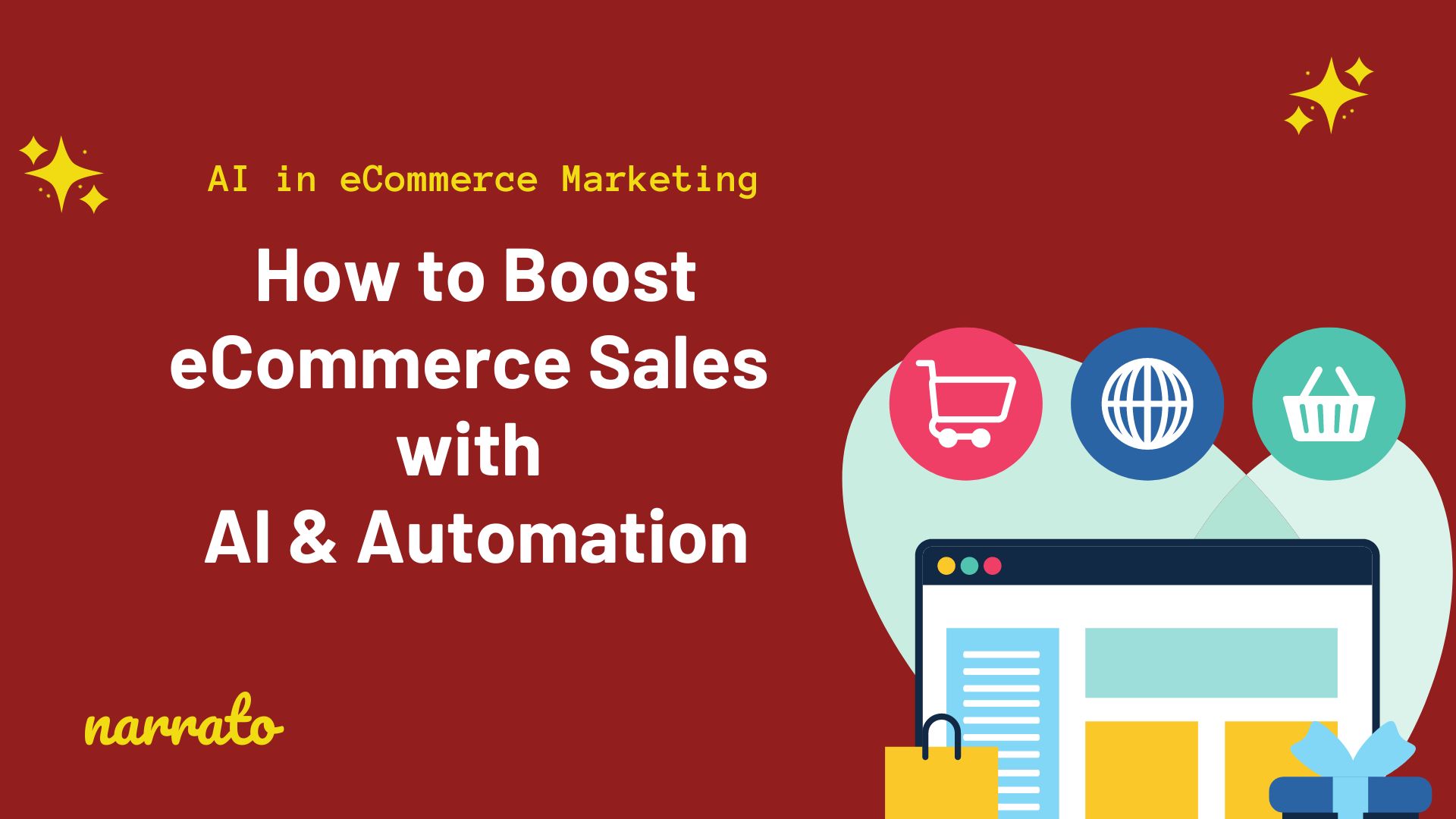The eCommerce space is very competitive, and you need to leverage the latest tools to stay ahead of the curve. Artificial intelligence or AI for eCommerce marketing and sales is one of the best technologies to help you stand out. AI in eCommerce can streamline your operations, enhance customer experiences, drive growth, and ensure long-term success in a competitive market.
Because of AI’s benefits, over 60% of marketers plan to increase their spending on AI tools by up to 60% in 2024, according to No Brainer’s eCommerce Trends Reports.
With that in mind, let’s discuss some strategies and best practices for using AI and automation to boost your eCommerce game.
TL;DR Here’s a quick video summary of the article –
How to use automation and AI in eCommerce for success
- Use AI in eCommerce for automated content creation
- Use an email marketing platform to automate your eCommerce emails
- Automate your social media advertising campaigns using AI in eCommerce
- Use AI to offer personalized product recommendations
- Use AI-powered chatbots and virtual assistants for quick support
Best practices for implementing AI and automation in eCommerce

How to use automation and AI in eCommerce for success
Here are five ways to use AI tools for eCommerce to increase your sales and drive growth.
1. Use AI in eCommerce for automated content creation
One of the primary advantages of using AI is the speed at which you can accomplish tasks. Work that would often take hours or days to complete now takes a fraction of the time. This rapid turnaround allows you to stay ahead of your content schedule and helps you respond quickly to market trends and customer needs.
Generative AI can also help bring down your content production costs. Traditionally, eCommerce content creation would involved hiring writers, editors, and designers, which was expensive for eCommerce stores looking to optimize their budgets.
AI content creation tools like Narrato allow you to automate and simplify a significant portion of this workload and create compelling eCommerce content. That way, your team can focus on more strategic tasks like building customer relationships and enhancing the customer experience.

Narrato offers an extensive suite of AI content creation tools to create engaging eCommerce marketing and sales content. These AI tools for eCommerce marketing include:
- AI Product Description Generator: The AI product description generator can create compelling descriptions from just a few product details. The AI bulk product description generator creates hundreds, or even thousands, of SEO product descriptions at lightning speed – perfect for eCommerce listings and product pages.
- AI Video Script & Description Generators: The AI video script generator helps you generate engaging scripts for YouTube product videos, tutorials, product reviews, and more. You can create scripts for videos up to 6 minutes long and with more than one host too. There is an AI video description generator too for creating SEO descriptions for your videos.
- AI Blog Writer: With the AI blog writing tools all your blog content creation, from ideation and creation to optimization, is taken care of. There are several useful templates like AI blog article generator from URLs and documents, AI blog article from SEO brief, blog article from outline, and more. It can also be used to create buyer guides for your eCommerce business.
- AI Social Media Post Generator: Creating engaging and captivating content for your social media campaigns is super quick and easy with Narrato’s AI social media post generator. This tool also has several templates for social posts such as posts with links, quotes, themes, and even holiday posts.
- AI Content Genie: This AI content autopilot on Narrato generates weekly content and social media posts automatically from your website and chosen themes. This AI tool for automated content creation also lets you schedule and publish posts directly to your social media accounts from Narrato.
- AI Landing Page Generator: Generate high-quality web copy for landing pages, category pages, and more within seconds. The AI landing page generator and other AI copywriting tools on Narrato save hours of work and give you professional copy that drives conversions and ROI. You can also bulk generate copy for several pages in one go, using the AI bulk content generation feature.
- AI SEO Writer: Narrato offers a number of different AI tools for SEO content creation. The AI keyword generator helps with keyword discovery. The SEO content brief generator gives you comprehensive content SEO briefs with more keywords, questions, and references. The AI SEO writer helps you create search-optimized content and improve content. SEO content plays a key role in not just regular searches but also for voice-enabled shopping.
With Narrato’s AI SEO tools, you can ensure that your content is optimized for long-tail keywords and the kind of queries that searchers would use in voice-enabled shopping as well. Thus, it not just enhances your eCommerce content but also customer experience with search and content.
When it comes to artificial intelligence in eCommerce content creation, planning and optimization, Narrato has everything you need. Along with powerful AI tools, it also has content project management and collaboration features that make it a complete package for eCommerce marketing and sales teams.

2. Use an email marketing platform to automate your eCommerce emails
Email is the best channel for growing engagement and sales for your eCommerce store. In fact, 41% of marketers say that email is their most effective marketing channel. In addition, 81% of small and medium businesses believe email marketing increases customer retention and helps in customer acquisition.
With automation and AI tools for eCommerce, you can significantly enhance the impact of your marketing and sales campaigns.
Email marketing platforms can help you analyze large data sets and segment your audience based on their behavior and preferences. You can then craft personalized messages that resonate with individual subscribers.
This level of personalization leads to higher engagement rates and better customer relationships. In fact, customized experiences influence the decision of 71% of customers when it comes to engaging with your emails.
Email automation tools can also determine the optimal times to send your sales emails to each recipient by analyzing past interactions and behavior patterns. This way, your emails reach the right people at the right time, maximizing their impact.

Some of the best marketing automation tools include:
- Sender: Known for its affordable (yet powerful) email automation capabilities, such as personalized campaigns, advanced segmentation, and triggered emails.
- Mailchimp: Offers robust marketing automation features such as sending emails based on user actions and time-based triggers.
- ActiveCampaign: Provides tools that enable detailed segmentation and complex automation workflows.
- Drip: Offers advanced automation workflows and segmentation tools, focusing on customer journeys and behaviors.
- ConvertKit: Designed for creators, ConvertKit offers automation features such as visual workflows and subscriber tagging.
- GetResponse: Provides an all-in-one marketing platform with robust email automation features, including autoresponders, advanced segmentation, and dynamic content.
- HubSpot: Includes features like personalized email campaigns, detailed reporting, and a drag-and-drop email editor as part of its larger CRM platform.
- Klaviyo: Known for its strong focus on eCommerce. It has automation features such as automated email series, detailed segmentation, and predictive analytics.
- Instantly: An all-in-one cold email software company that helps startups, agencies, and sales teams scale outreach while maintaining deliverability.
3. Automate your social media advertising campaigns using AI in eCommerce
AI can revolutionize the way you create social media content. With AI-driven tools, you can generate compelling ad copy, images, and videos tailored to your target audience.
Hootsuite’s Social Media Trends report shares that 85% of companies use AI in 2024 to produce ad content from scratch. Meanwhile, 82% use it to generate new ideas for their social media content.
AI tools analyze user data and preferences to create personalized and engaging ads that resonate with potential customers.
For example, Narrato’s AI Ad Generator creates compelling copy for Google, Facebook, Instagram, LinkedIn, and marketplace ads in seconds — with relevant headlines, CTAs, hashtags, and stunning images.

In addition, AI can improve your ad placement across various social media platforms. It analyzes vast amounts of data to determine the best times and locations to display your ads for better engagement. As a result, your ads reach the right audience at the appropriate time, which increases the likelihood of conversions.
You can also use AI to monitor your ads’ performance and make real-time adjustments to optimize results. This includes adjusting bids, targeting different audience segments, and modifying ad content based on customer feedback.
4. Use AI to offer personalized product recommendations
Personalized shopping experiences can significantly boost customer satisfaction and sales. In fact, 76% of customers say they’re more likely to buy from a business that personalizes their experiences.
You can leverage customer data to create tailored and personalized product recommendations that resonate with individual shoppers. Most businesses are already doing this. According to Twilio’s 2024 Customer Engagement report, 70% of companies use AI to personalize their content and marketing strategies.
AI-product recommendation tools like Nosto and LimeSpot can analyze vast amounts of customer data through machine learning. This data includes browsing history, purchase behavior, and demographic information. They can then predict what products a customer is most likely interested in.
As a result, you’re able to offer highly personalized product recommendations that enhance the shopping experience and increase the likelihood of conversions.
Another advantage AI offers is the ability to scale your personalization efforts. Manually curating recommendations for each customer would be impractical and time-consuming. However, AI can automate this process and offer personalized recommendations to thousands of customers simultaneously.
5. Use AI-powered chatbots and virtual assistants for quick support
AI-powered chatbots can respond instantly to customer inquiries, helping shoppers receive the information they need without delay.
The good thing about AI bots is that they’re available 24/7. This means they can offer chat support outside regular business hours.
CX Network’s 2024 Customer Service Trends Report shares that AI’s effectiveness has increased customer expectations regarding client support. Most consumers won’t take anything less since they know AI is much faster and more efficient in serving them.
To meet this demand, you need to implement AI-powered chatbots like ManyChat and Dialogflow. These tools use natural language processing (NLP) to understand customer queries and offer swift and consistently high-quality responses, which is now the standard customers expect.

Best practices for implementing AI and automation in eCommerce
Like everything in business, you must follow some best practices to ensure your AI implementation is successful.
Let’s look at tips for selecting the right AI tools for your eCommerce business and discuss some ways to integrate AI and automation seamlessly into your existing platforms.
How to select the right AI tools for your eCommerce business
Choosing the right AI solutions for your eCommerce store is crucial. The best tools will help you maximize efficiency and enhance customer experiences.
With that in mind, here are some tips to help you make the best choice:
- Identify your goals: Are you looking to offer instant customer support, customize product recommendations, or automate your marketing campaigns? Knowing your objectives will help you focus on tools that meet your specific requirements.
- Evaluate the features you need: Look for AI tools that offer your desired features and capabilities. For instance, if you want to enhance customer support, choose tools with robust chatbot functionalities. For marketing automation, ensure the tool can handle segmentation, personalized messaging, and performance analytics.
- Check integration capabilities: The AI tools you choose should seamlessly integrate with your existing eCommerce platform and other business tools. This will help you avoid compatibility issues and ensure smooth data flow between different systems.
- Consider scalability: As your eCommerce business grows, you’ll need tools to handle increased data volumes and more complex tasks. So, optimize your data center infrastructure with colocation solutions (see the differences between cloud vs colocation) that allow your AI tools to scale with your business operations and together with infrastructure monitoring tools ensure seamless performance.
- Assess user-friendliness: Invest in tools that are easy to use and require minimal technical expertise. User-friendly interfaces and comprehensive support will help your team adapt quickly and use the new tools effectively.
- Read reviews and case studies: These will help you understand how the tool has benefited other online stores so you can be sure it’s reliable.
Strategies for integrating AI and automation seamlessly
Integrating AI and automation tools into your eCommerce platform requires careful planning and execution.
Here are some strategies to ensure smooth integration:
- Start with a pilot project: Test the AI tool in a controlled environment to identify potential issues and make necessary adjustments before a full-scale rollout.
- Ensure data quality: Clean and organize your data to make sure it’s accurate and up-to-date to improve the performance of AI algorithms and automation processes.
- Train your team: Provide comprehensive training on how to use the new AI and automation tools. Ensure employees understand how to integrate them into their daily workflows.
- Monitor and optimize: Use analytics and customer feedback to identify areas for improvement and optimize processes for better results. With Dynamics 365 Business Central, you can gain real-time insights into your business performance, streamlining operations and ensuring continuous improvement.
Summing up
Integrating AI in eCommerce marketing can transform your business by enhancing efficiency, personalizing customer experiences, and driving growth.
In summary, you can use AI to create content, automate email marketing, optimize social media advertising, personalize product recommendations, and offer quick support with AI-powered chatbots.
So embrace AI and automation to improve eCommerce sales and take your business to the next level.





